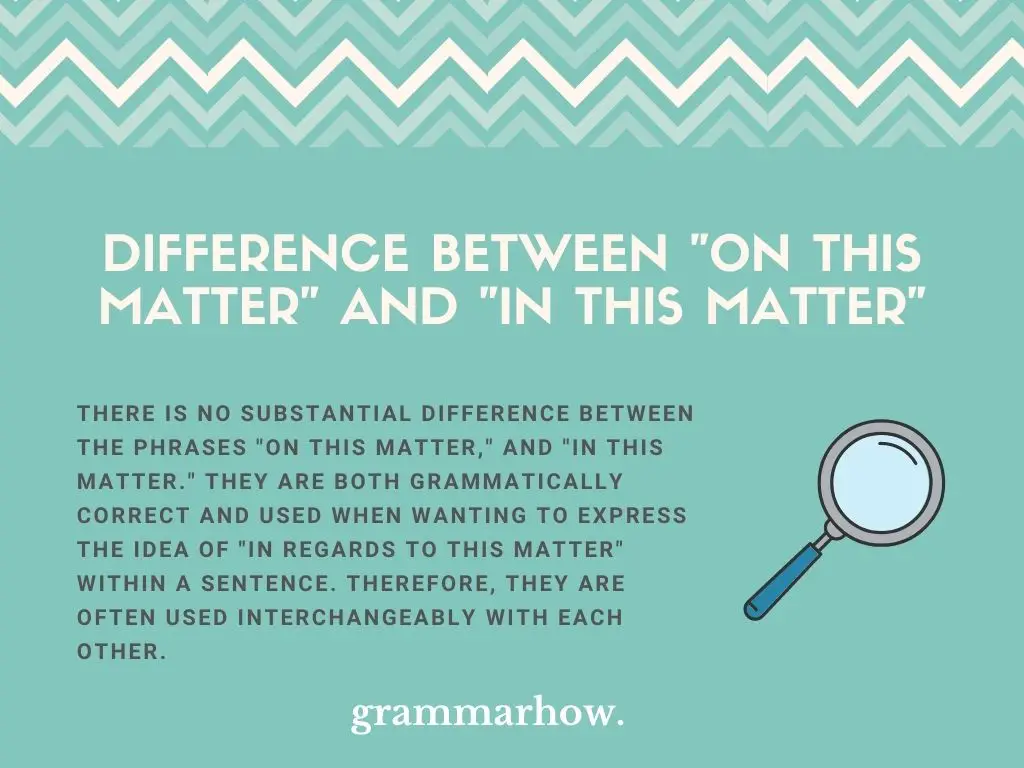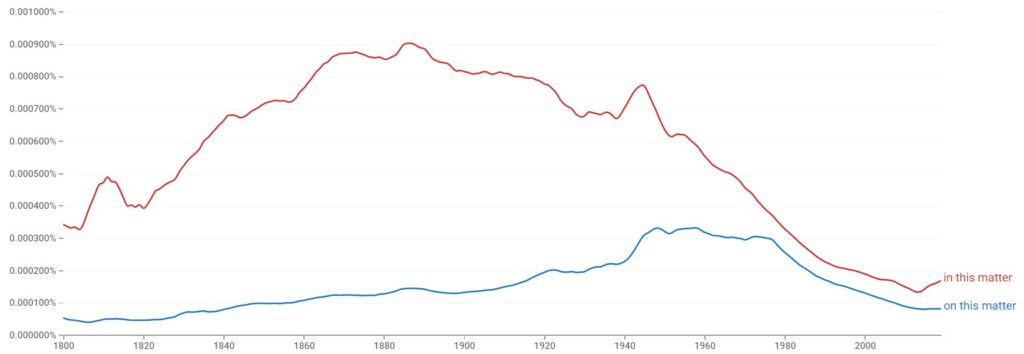The phrases “on this matter” and “in this matter” are used when speaking about a specific topic. However, the prepositions “on” and “in” can often cause confusion about when to be used, especially in idiomatic phrases. Here we discuss the meaning of these phrases and the proper usage for each.
What Is The Difference Between “On This Matter” And “In This Matter”?
There is no substantial difference between the phrases “on this matter,” and “in this matter.” They are both grammatically correct and used when wanting to express the idea of “in regards to this matter” within a sentence. Therefore, they are often used interchangeably with each other.

One meaning of the preposition “on” is that it refers to having (the thing mentioned) as a topic (i.e., a study on eating habits). The preposition “in” can mean expressing inclusion or involvement or an integral part of an activity (i.e., participating in the competition.)
Based on these explanations, you can see how both “on this matter” and “in this matter” can make perfect sense.
What Does “On This Matter” Mean?
“On this matter” means that you are referring to the “matter” as the topic being discussed. Use it preferably when talking about thinking and feelings (i.e., opinions) on a topic as opposed to actions that you will take or have taken.
Here are some example sentences where you can more clearly see what is meant by this explanation.
- The detective told the lawyer that he would question his client on this matter before releasing him.
- I would like your opinion on this matter before I proceed so I can be sure that I’m making the right decision.
- The legal department has done a great deal of research on this matter and has determined that the client did not have a very strong case.
From these sentences, you can see how they satisfy the meaning given for “on this matter.” All three of them involve some thinking or expression of feelings about the topic vs. an actual action taken regarding the “matter.”
What Does “In This Matter” Mean?
The phrase “in this matter” is another one that expresses regard for a specific topic. This phrase is generally the preferred one to use to indicate an action that you will take or have taken. Therefore, the word or phrase that proceeds “in this matter” is often a verb.
The preposition “in” tends to indicate involvement in an activity, which would lend preference to having a preceding verb. However, that a verb must proceed the phrase “in this matter” is not a hard and fast rule in the English Language, and its usage comes down to a matter of preference.
See how in these examples sentences the word or phrase right before the expression “in this matter” is a verb and therefore the context suggests doing a particular thing in a certain way.
- Can you tell me what action you will take in this matter, so I can better discern my own actions?
- Michael was not behaving very prudently in this matter and it led to bad decision making.
- I didn’t like being pressured to make a decision in this matter and felt like I should have been given more time.
- They enlightened me in this matter and I realized I was thinking about it in the wrong way.
All of these sentences have a greater sense of action than in the example sentences for “on this matter,” which dealt more with thoughts or opinions. However, it is such a subtle difference that one would not misinterpret the meaning of the sentence if “on this matter” were used instead.
Are “On this Matter” And “In This Matter” Interchangeable?
There is no specific rule in the English Language to fully distinguish when “on this matter” should be used instead of “in this manner.” Therefore the two idiomatic phrases are viewed as interchangeable with each other and which one to use depends on preference.
As mentioned in the previous sections, there is a slight difference in the meaning of the preposition “in” and the preposition “on,” but in the two phrases we are discussing here, the difference is so very subtle that it is not worth distinguishing the two much further.
Is “On this Matter” Or “In This Matter” Used The Most?
Both “on this matter” and “in this matter” have been used throughout history up until the present day. However, the phrase “in this manner” has greater usage and is the more popular of the two options.
The Google Ngram Viewer that shows the comparison between the phrases shows that “on this matter” has had relatively steady usage since 1800, experiencing a slight spike from about 1940-1980.

The phrase “in this matter” has had much higher usage throughout much of history, particularly from about 1800 until the mid-1970s. From about 1974, its usage started to rapidly decline and as of 2019, it was only slightly higher than the usage of the phrase “on this matter.” This trend suggests that the two phrases have evened out and are currently used similarly.
Which Other Prepositions Can Be Used Before “This Matter”?
In addition to “on” and “in,” you can use the prepositions “with,” “of,” “over,” and “about” in front of “this matter” to create a different phrase that is also grammatically correct and has a similar meaning.
With This Matter
Use “with this matter” when describing something that occurs “in relation to” the matter being discussed or described. This phrase is typically preceded by a tangible act or action that someone is performing. It can be used interchangeably with “in this matter.”
- We need to deal with this matter first before moving on to the next issue.
- I’m sorry that I’m unable to assist you with this matter, but I don’t have the expertise to be of much help.
Of This Matter
The phrase “of this matter” is used when referring to a specific topic or thing (the “matter.”) It is primarily used more conceptually like when thinking of something (i.e., an opinion, thought, or feeling) as opposed to acting on something (i.e., proceeding or enlightening). It can be used interchangeably with “on this matter.”
- I was not aware of this matter when I agreed to take on the additional responsibility.
- When he gave his opinion of this matter, it helped me to change my opinion on it as well.
Over This Matter
Use the phrase “over this matter” to indicate times when an action is being taken with regards to a specific topic or subject. The preposition “over” means that something is happening on the subject of or regarding a specific topic.
- I was so angry over this matter that I didn’t speak with him again for more than a year.
- They had a heated debate over this matter the other day and in the end, I don’t think anyone really won.
About This Matter
The phrase “about this matter” means that you are referring to something that concerns a specific topic or issue. It can be used to indicate thinking about something or to indicate an action done to something and is interchangeable with “on this matter” in many contexts.
- I’ll need to talk to him about this matter before the end of the day because it is quite concerning to me.
- I was surprised that he asked my opinion about this matter, as he was always known to be the expert in this subject.
You may also like:
“Assist With” Or “Assist In” – Difference (With Examples)
“Help With” or “Help In” – Difference (With Examples)

Martin holds a Master’s degree in Finance and International Business. He has six years of experience in professional communication with clients, executives, and colleagues. Furthermore, he has teaching experience from Aarhus University. Martin has been featured as an expert in communication and teaching on Forbes and Shopify. Read more about Martin here.
